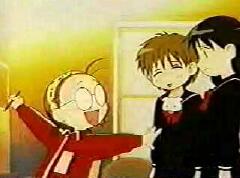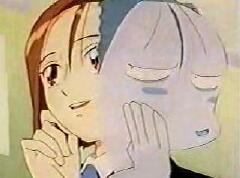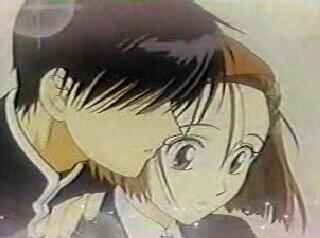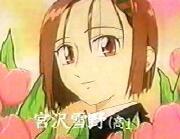
Kare Kano
Not having a plot isn't such a bad thing, after all

 Review by: M.H. "Mind-Fuck addict" Torringjan
Review by: M.H. "Mind-Fuck addict" Torringjan
Length: 26 episodes, 25 minutes each
Genre: Romantic comedy
Watched: 23.5 episodes, subbed
Hideaki Anno's been known to fuck a couple of minds. After all, he's the guy who was responsible for the art-orgasmic series known as Neon Genesis Evangelion and the two movies of similar and less-thought-out names. So, when I heard that he had done another series, I immediately reminded myself how long it had taken me to escape my therapist after watching End of Eva. Then, I saw that it was a romantic series, and I thought three letters, and they weren't DNC (does not compute). Then, out of sheer morbid curiosity and with my medications nearby, I plunged headfirst into "Kareshi no Kanojyo no Jijyo," or "His and Hers Circumstances," or "Kare Kano," or "Hideaki Anno's Series That Wasn't Evangelion." The following are my findings on this much-too-overlooked series.
Plot synopsis: Miyazawa Yukino is the over-achiever of her school, and is looked up to by everyone. Suddenly, as she enters into high school, she meets Arima Souichiro, another over-achiever who's liked just as much, if not more, by everyone. Miyazawa's performance and outward appearance at school, however,  is just a false face that she shows to the world to get respect and attention. Arima finds this out and uses the fact to get close to her, and eventually confesses his love to her. She initially rejects him but eventually accepts him, and they start dating. That's the first three episodes, and the rest of the series is about how they interact with the other students and each other, getting used to the relationship and whatnot.
is just a false face that she shows to the world to get respect and attention. Arima finds this out and uses the fact to get close to her, and eventually confesses his love to her. She initially rejects him but eventually accepts him, and they start dating. That's the first three episodes, and the rest of the series is about how they interact with the other students and each other, getting used to the relationship and whatnot.
Artwork: The artwork in this series is stylistic, if nothing else. Half of the time, the characters are super-deformed, the other half, they're respectably drawn and look like actual people. The backgrounds are pretty beautifully rendered and very well-done for normal city-scapes. The character design is normal, but distinguishes itself from other normal character designs because of the lack of certain cliches that can be seen in other character designs, such as the lack of gratuitous cleavage, no outrageous hairdos, no Barbie-girls (sorry fanboys, you ain't finding any service here). These normal characters truly look like normal characters. Sometimes, Anno even decided, "a live action shot would work well here! Do it! Now, now, now!" So, they did. There's a lot of close-ups in this series, as you can see from the representative screencaps.
 Music: The music for the series is another mixed bag, as are most of the aspects of this series. At times, it has a down-home sort of feel with trumpet background music accented by snappy background vocals along the lines of "ba-ba-ya-ba." It does an excellent job of adding to the music while not distracting from the scene that's happening over-top of it. The rest of the time, the music has a pensive, classical feel to it, utilizing violins and guitars to accent the emotion in the scene. This is the only series I've found so far that has classical violin music playing in the background of a love-making scene (which was very tastefully done, in my opinion). The music was excellently done for the whole series as a mood-setter.
Music: The music for the series is another mixed bag, as are most of the aspects of this series. At times, it has a down-home sort of feel with trumpet background music accented by snappy background vocals along the lines of "ba-ba-ya-ba." It does an excellent job of adding to the music while not distracting from the scene that's happening over-top of it. The rest of the time, the music has a pensive, classical feel to it, utilizing violins and guitars to accent the emotion in the scene. This is the only series I've found so far that has classical violin music playing in the background of a love-making scene (which was very tastefully done, in my opinion). The music was excellently done for the whole series as a mood-setter.
Characters: This series is the most character-driven thing that I've ever seen, which is why the characters have to be the most complex of any series that I've seen. Start with Miyazawa, who, as mentioned earlier, feigns dignity when outside of her house but turns into an anime-style dork when she returns home, kind of the opposite of Narusegawa without the violence. Her self-esteem initially lies in her ability to make people like her without them realizing that she's making them like her. Arima is the perfect guy externally. He's athletic, intelligent, friendly, and rich. He opens up to Miyazawa and the other side of his personality becomes readily clear. His parents were hateful people, the black sheep of his family, so when they left or died, his aunt and uncle took him in. He is constantly in a battle with the darker forces of his personality, and only losing in rare situations. In the end, all he really wants is to be loved. When the two of those meet, they promise to let their  true personalities show to the world. Many of these facts come out in the form of internal monologues, which seem to be trademarked by Anno. Miyazawa lives in a family with two sisters, her mother, father, and dog, Pero-Pero. They act as a real family would, caring for each other, joking around with each other, and generally doing familial things. Arima's family, on the other hand, seem distant, cold, and artificial, even though his "parents" are proud of him and love him, and understand that he's a pure soul who's been dealt a bad lot in life. When Miyazawa starts showing her true personality to the world, she gains more friends, whose personalities run the gamut and who show a variety of interests. Miyazawa's main rival for Arima's affection is Tsubasa Shibahime, a childhood friend who developed a crush on him for his being her friend through tough times. Asaba Hideaki is another friend of Arima whose womanizing tendencies get him little respect from the others, and he expects to use Arima to get girls until Arima gets together with Miyazawa. So, I guess you'd call him a rival for Arima, or something. Shonen-ai potential high on this one, girls!
true personalities show to the world. Many of these facts come out in the form of internal monologues, which seem to be trademarked by Anno. Miyazawa lives in a family with two sisters, her mother, father, and dog, Pero-Pero. They act as a real family would, caring for each other, joking around with each other, and generally doing familial things. Arima's family, on the other hand, seem distant, cold, and artificial, even though his "parents" are proud of him and love him, and understand that he's a pure soul who's been dealt a bad lot in life. When Miyazawa starts showing her true personality to the world, she gains more friends, whose personalities run the gamut and who show a variety of interests. Miyazawa's main rival for Arima's affection is Tsubasa Shibahime, a childhood friend who developed a crush on him for his being her friend through tough times. Asaba Hideaki is another friend of Arima whose womanizing tendencies get him little respect from the others, and he expects to use Arima to get girls until Arima gets together with Miyazawa. So, I guess you'd call him a rival for Arima, or something. Shonen-ai potential high on this one, girls!
Plot: This is episodism at its highest here. There is nil for a continuing plot, other than the extremely generic, "Arima and Yukino have a relationship." The charm of the show lies in the way that it endlessly evolves most of the characters in the cast, showing in the most artful way possible how peoples' personalities can react to every-day life. Internal conflict creates the plot of this high-school drama, from the stresses in the relationship to the... ummm... other stresses in the relationship. Luckily, they keep the drama interesting by constantly injecting a subtle sense of humor into the depiction of the thought process. And sometimes a not-so-subtle sense of humor gets thrown in, just to shake things up, but only when the characters involved justify it through their personalities. The only drawback is that the series tries to get a lot of time out of summaries to make up for their lack of plot. The equivalent of probably three episodes is taken up by the summaries at the beginning of many of the normal episodes and the whole summary episodes (14 and 15, both). Also, as was a major complaint with Eva, there is no real ending to this series. The final screen is text, which reads, "And the story goes on," or something along the lines. Really, I understand that this is a story about everyday life, which goes on for years (sometimes a very many years, from what I understand), but would it be that difficult to give a definite way to say, "yup, that's all I'm going to see out of them!" I don't think so.
 CHICKS!!! As I said earlier, if you're looking for service, you're out of luck. However, the personalities of the characters may be plenty enough to entice the drooling fanboy, such as myself. I personally enjoy Miyazawa because of how real her personality is. Her over-dramatized thought process is a high cute-factor to make up for the lack of extraordinary physical attraction. Really, the vast majority of the chicks have some personality facet that can plant the seed of attraction in anyone's mind. Except for Shibahime. 'Cause I ain't touching that one with a ten-foot pole, and I doubt that anyone in their right minds would, either. And the worst part, in my case, is that you can't really fault Arima for already having dibs on Miyazawa. The guy's just so perfect, you can't even hate the sunuvabitch for getting there first! I hate it when that happens!
CHICKS!!! As I said earlier, if you're looking for service, you're out of luck. However, the personalities of the characters may be plenty enough to entice the drooling fanboy, such as myself. I personally enjoy Miyazawa because of how real her personality is. Her over-dramatized thought process is a high cute-factor to make up for the lack of extraordinary physical attraction. Really, the vast majority of the chicks have some personality facet that can plant the seed of attraction in anyone's mind. Except for Shibahime. 'Cause I ain't touching that one with a ten-foot pole, and I doubt that anyone in their right minds would, either. And the worst part, in my case, is that you can't really fault Arima for already having dibs on Miyazawa. The guy's just so perfect, you can't even hate the sunuvabitch for getting there first! I hate it when that happens!
Overall: Note to anyone who calls this "Hideaki Anno's Series That Isn't Evangelion;" stop. This series has some of the best drama, most intelligent writing, some of the most interesting and independently recognizable characters of any anime series out there. Just because the series doesn't have large explosions, mechs that Salvador Dali wouldn't think of drawing, and so-so-tight plug-suits doesn't mean that it isn't a good series. If that's all you're looking for, for the love of Nabeshin, pick up RahXephon and get mind-fucked all over again. If you want to laugh, watch a real art anime, or actually care about the characters that're on the screen, then I'd recommend picking this series up. I really don't think I'm overgrading for once by giving this rating to this series.
In a Nutshell:
+ Deep characters
+ Great humor
+ Decent artwork
- Episodic
- No ending
Overall rating: 9/10
Back to main page


 Review by: M.H. "Mind-Fuck addict" Torringjan
Review by: M.H. "Mind-Fuck addict" Torringjan is just a false face that she shows to the world to get respect and attention. Arima finds this out and uses the fact to get close to her, and eventually confesses his love to her. She initially rejects him but eventually accepts him, and they start dating. That's the first three episodes, and the rest of the series is about how they interact with the other students and each other, getting used to the relationship and whatnot.
is just a false face that she shows to the world to get respect and attention. Arima finds this out and uses the fact to get close to her, and eventually confesses his love to her. She initially rejects him but eventually accepts him, and they start dating. That's the first three episodes, and the rest of the series is about how they interact with the other students and each other, getting used to the relationship and whatnot. Music: The music for the series is another mixed bag, as are most of the aspects of this series. At times, it has a down-home sort of feel with trumpet background music accented by snappy background vocals along the lines of "ba-ba-ya-ba." It does an excellent job of adding to the music while not distracting from the scene that's happening over-top of it. The rest of the time, the music has a pensive, classical feel to it, utilizing violins and guitars to accent the emotion in the scene. This is the only series I've found so far that has classical violin music playing in the background of a love-making scene (which was very tastefully done, in my opinion). The music was excellently done for the whole series as a mood-setter.
Music: The music for the series is another mixed bag, as are most of the aspects of this series. At times, it has a down-home sort of feel with trumpet background music accented by snappy background vocals along the lines of "ba-ba-ya-ba." It does an excellent job of adding to the music while not distracting from the scene that's happening over-top of it. The rest of the time, the music has a pensive, classical feel to it, utilizing violins and guitars to accent the emotion in the scene. This is the only series I've found so far that has classical violin music playing in the background of a love-making scene (which was very tastefully done, in my opinion). The music was excellently done for the whole series as a mood-setter. true personalities show to the world. Many of these facts come out in the form of internal monologues, which seem to be trademarked by Anno. Miyazawa lives in a family with two sisters, her mother, father, and dog, Pero-Pero. They act as a real family would, caring for each other, joking around with each other, and generally doing familial things. Arima's family, on the other hand, seem distant, cold, and artificial, even though his "parents" are proud of him and love him, and understand that he's a pure soul who's been dealt a bad lot in life. When Miyazawa starts showing her true personality to the world, she gains more friends, whose personalities run the gamut and who show a variety of interests. Miyazawa's main rival for Arima's affection is Tsubasa Shibahime, a childhood friend who developed a crush on him for his being her friend through tough times. Asaba Hideaki is another friend of Arima whose womanizing tendencies get him little respect from the others, and he expects to use Arima to get girls until Arima gets together with Miyazawa. So, I guess you'd call him a rival for Arima, or something. Shonen-ai potential high on this one, girls!
true personalities show to the world. Many of these facts come out in the form of internal monologues, which seem to be trademarked by Anno. Miyazawa lives in a family with two sisters, her mother, father, and dog, Pero-Pero. They act as a real family would, caring for each other, joking around with each other, and generally doing familial things. Arima's family, on the other hand, seem distant, cold, and artificial, even though his "parents" are proud of him and love him, and understand that he's a pure soul who's been dealt a bad lot in life. When Miyazawa starts showing her true personality to the world, she gains more friends, whose personalities run the gamut and who show a variety of interests. Miyazawa's main rival for Arima's affection is Tsubasa Shibahime, a childhood friend who developed a crush on him for his being her friend through tough times. Asaba Hideaki is another friend of Arima whose womanizing tendencies get him little respect from the others, and he expects to use Arima to get girls until Arima gets together with Miyazawa. So, I guess you'd call him a rival for Arima, or something. Shonen-ai potential high on this one, girls! CHICKS!!! As I said earlier, if you're looking for service, you're out of luck. However, the personalities of the characters may be plenty enough to entice the drooling fanboy, such as myself. I personally enjoy Miyazawa because of how real her personality is. Her over-dramatized thought process is a high cute-factor to make up for the lack of extraordinary physical attraction. Really, the vast majority of the chicks have some personality facet that can plant the seed of attraction in anyone's mind. Except for Shibahime. 'Cause I ain't touching that one with a ten-foot pole, and I doubt that anyone in their right minds would, either. And the worst part, in my case, is that you can't really fault Arima for already having dibs on Miyazawa. The guy's just so perfect, you can't even hate the sunuvabitch for getting there first! I hate it when that happens!
CHICKS!!! As I said earlier, if you're looking for service, you're out of luck. However, the personalities of the characters may be plenty enough to entice the drooling fanboy, such as myself. I personally enjoy Miyazawa because of how real her personality is. Her over-dramatized thought process is a high cute-factor to make up for the lack of extraordinary physical attraction. Really, the vast majority of the chicks have some personality facet that can plant the seed of attraction in anyone's mind. Except for Shibahime. 'Cause I ain't touching that one with a ten-foot pole, and I doubt that anyone in their right minds would, either. And the worst part, in my case, is that you can't really fault Arima for already having dibs on Miyazawa. The guy's just so perfect, you can't even hate the sunuvabitch for getting there first! I hate it when that happens!